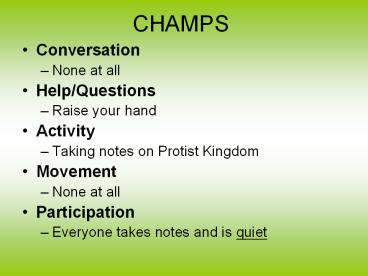CHAMPS - PowerPoint PPT Presentation
CHAMPS
CHAMPS Conversation None at all Help/Questions Raise your hand Activity Taking notes on Protist Kingdom Movement None at all Participation Everyone takes notes and is ... – PowerPoint PPT presentation
Title: CHAMPS
1
CHAMPS
- Conversation
- None at all
- Help/Questions
- Raise your hand
- Activity
- Taking notes on Protist Kingdom
- Movement
- None at all
- Participation
- Everyone takes notes and is quiet
2
Kingdom Protists
3
Before We Start..
- Are protists unicellular or multicellular?
- Do protists have a nucleus?
4
Protist Reproduction
- Congjuation
- Asexually by mitosis
- Sexually using gametes
5
Classification of Protists
- Protists are classified by the way they obtain
food. - 3 groups of Protists
- Animal-like
- Plant-like
- Fungus-like
6
Animal Like Protists
- Consume other organisms for food
- Known as protozoan (first animals)
- Move around to find food
- Ex Amoeba, Paramecium
7
Plant Like Protists
- Produce their own food using chlorophyll and
photosynthesis. - Ex Euglena, Algae
8
Fungus Like Protists
- Consume dead or decaying matter
- Called slime molds or water molds
9
Types of movement
- Flagella- whip like structure that propel a cell
to move - Psuedopod- false foot ?projection of the
cytoplasm - Cilia- hair like projection
10
Feeding Structures
- Contractile vacuole- cavity used to collect water
and remove it from the cell. - Food vacuole- cavity used that temporality stores
food. - Oral groove- used to take in food.
11
Diseases
- Malaria- carried by Plasmodium on a mosquito.
- An infected mosquito bites a human.
- The mosquitoes saliva which has the Protist, gets
into the humans blood. - The Protist infects the human liver cells and red
blood cells, where it multiplies quickly. - This causes the RBCs to burst and release more
protists.
12
Questions
PowerShow.com is a leading presentation sharing website. It has millions of presentations already uploaded and available with 1,000s more being uploaded by its users every day. Whatever your area of interest, here you’ll be able to find and view presentations you’ll love and possibly download. And, best of all, it is completely free and easy to use.
You might even have a presentation you’d like to share with others. If so, just upload it to PowerShow.com. We’ll convert it to an HTML5 slideshow that includes all the media types you’ve already added: audio, video, music, pictures, animations and transition effects. Then you can share it with your target audience as well as PowerShow.com’s millions of monthly visitors. And, again, it’s all free.
About the Developers
PowerShow.com is brought to you by CrystalGraphics, the award-winning developer and market-leading publisher of rich-media enhancement products for presentations. Our product offerings include millions of PowerPoint templates, diagrams, animated 3D characters and more.































